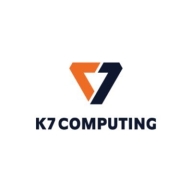

Find out what your peers are saying about Microsoft, SentinelOne, Check Point Software Technologies and others in Anti-Malware Tools.
| Product | Market Share (%) |
|---|---|
| Microsoft Defender for Endpoint | 8.1% |
| K7 Antivirus Premium | 0.9% |
| Other | 91.0% |


| Company Size | Count |
|---|---|
| Small Business | 80 |
| Midsize Enterprise | 40 |
| Large Enterprise | 92 |
K7 Antivirus Premium is a highly effective antivirus software that protects computer systems from malware and viruses. It offers robust protection, with the ability to detect and remove threats effectively.
The user-friendly interface and frequent software updates enhance its usability. With reliable real-time scanning and advanced firewall protection, K7 Antivirus Premium ensures the security of devices.
Its lightweight nature and low system resource usage make it a valuable choice for users.
Microsoft Defender for Endpoint is a comprehensive security solution that provides advanced threat protection for organizations. It offers real-time protection against various types of cyber threats, including malware, viruses, ransomware, and phishing attacks.
With its powerful machine-learning capabilities, it can detect and block sophisticated attacks before they can cause any harm. The solution also includes endpoint detection and response (EDR) capabilities, allowing organizations to quickly investigate and respond to security incidents. It provides detailed insights into the attack timeline, enabling security teams to understand the scope and impact of an incident.
Microsoft Defender for Endpoint also offers proactive threat hunting, allowing organizations to proactively search for and identify potential threats within their network. It integrates seamlessly with other Microsoft security solutions, such as Microsoft Defender XDR, to provide a unified and holistic security approach. With its centralized management console, organizations can easily deploy, configure, and monitor the security solution across their entire network.
Microsoft Defender for Endpoint is a robust and scalable security solution that helps organizations protect their endpoints and data from evolving cyber threats.
We monitor all Anti-Malware Tools reviews to prevent fraudulent reviews and keep review quality high. We do not post reviews by company employees or direct competitors. We validate each review for authenticity via cross-reference with LinkedIn, and personal follow-up with the reviewer when necessary.